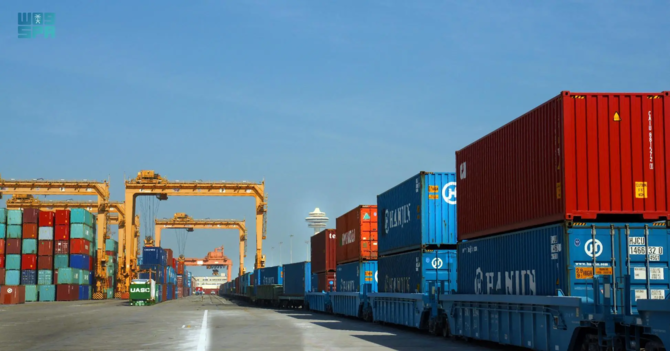RIYADH: Saudi Arabia’s King Abdulaziz Port in Dammam is set to enhance its maritime links with key ports in India and China with the introduction of a new shipping service.
The General Authority for Ports, also known as Mawani, announced the launch of the “Milaha Gulf Express 2,” or 2-MGX service, operated by Qatari navigation company Milaha.
The strategic move is set to enhance the port’s role in global trade, benefiting exporters, importers, and shipping agents by offering improved access to major international markets, a release by the body said.
The introduction of the 2-MGX service is a testament to King Abdulaziz Port’s growing significance within the global logistics network.
As Saudi Arabia continues to advance its National Strategy for Transport and Logistics Services, which aims to position the Kingdom as a leading global logistics hub, the port’s enhanced connectivity with India and China represents a key step in achieving these objectives.
The strategy is part of the broader Vision 2030 initiative, designed to diversify the economy and develop infrastructure that connects the Kingdom to international markets across three continents.
King Abdulaziz Port, known for its robust operational and logistical capabilities, is well-prepared to support this new service, according to a press release.
The port, located in the Eastern Province, features 43 fully serviced and equipped berths, with an annual handling capacity of up to 105 million tonnes of goods and containers.
Its advanced infrastructure, including specialized stations and state-of-the-art equipment, enables the efficient management of a wide range of cargo types, further strengthening the Kingdom’s position in global trade.
The new 2-MGX shipping service will link King Abdulaziz Port to seven strategic regional and international ports, including Ningbo, Shanghai, and Shekou in China; Nhava Sheva and Mundra in India; Sohar in Oman; and Hamad in Qatar.
The service will operate on a bi-monthly basis, with a capacity of up to 9,000 standard containers, ensuring regular and reliable trade routes that enhance the port’s competitiveness.
In line with its ongoing modernization efforts, the port has seen significant upgrades throughout the year, including the acquisition of 21 coastal and bridge cranes and the addition of 80 electric trucks.
These improvements are designed to increase the port’s flexibility and sustainability, enabling it to accommodate advanced and larger vessels with full productivity and efficiency.
The implementation of the 2-MGX service not only strengthens Saudi Arabia’s maritime links with vital Asian markets but also aligns with the Kingdom’s broader economic diversification goals.





















